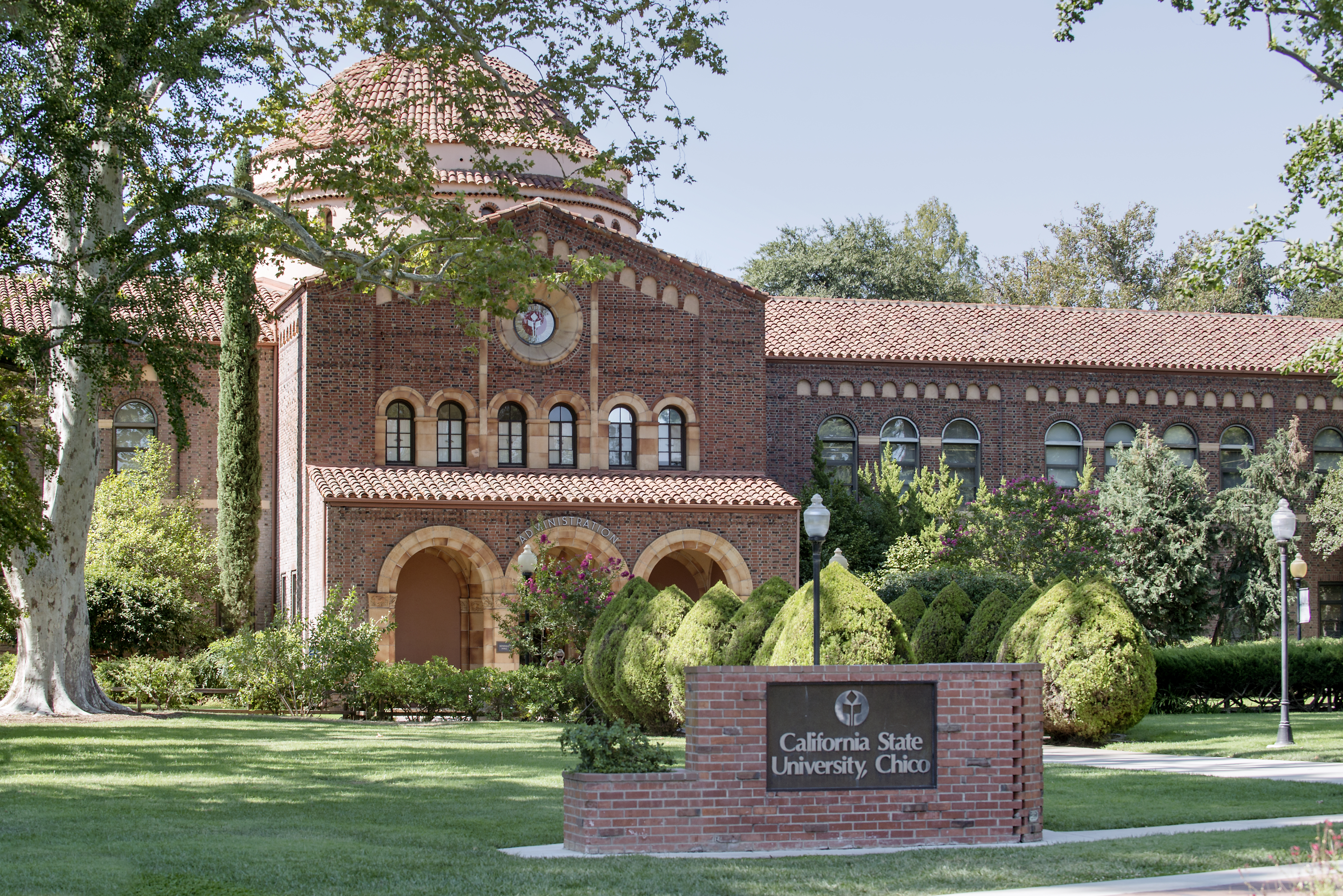Pigs, Goats, and Heifers, Oh, My!

The front of Kendall Hall is seen Friday, August 22, 2014 in Chico, Calif. (Jason Halley/University Photographer)
If you are anything like me, you may not know much about the University Farm. But after a guided tour by student Kayla Pauwels, my eyes were opened to the amazing things our 800-acre University Farm provides.
Split into livestock and crops and orchards units, the farm has been operating since the 1960’s and giving to the Chico State students and Chico community ever since.
“Each of our units is a separate entity. It operates as a different unit, and then as a whole we are the Chico State Farm,” Pauwels said.
Pauwels, a senior with a major in animal science and a minor in agriculture business, escorted me around the farm for an hour, describing the many different aspects the farm has.
Swine Unit
The swine unit is a bio-secure unit, which Pauwels described as a unit where no outside people are allowed in without “booting up.” Booting up consists of full overalls, boots, cleaning, and other protective gear so that the animals are kept safe from outside diseases.
Interesting Swine facts:
• The swine unit once had a male that weighed more than 800 lbs.
• Pigs are very social animals, so they’re kept in pens with other pigs so that they don’t get lonely.
Dairy Unit
The dairy cows are fully organic and are fed by organic products grown on the farm.
The organic dairy is currently the only organic dairy at a university west of the Mississippi.
Beef Unit
The farm has a partnership with Sierra Nevada Brewing Co. regarding the beef. “They purchase their own steers,” explained Pauwels. “They purchase them from a local producer. They bring them here. We feed them out and finish them with brewer’s grains which are the leftovers in the process of making beer.”
This partnership is different than others because Sierra Nevada pays for everything and the farm provides the labor as well as a unique student learning experience.
Student Gardens
Classes are held at the farm where students are able to tend their own personal gardens. The teacher provides them with a list of options to grow, depending upon the semester.
There are over 200 student gardens at the farm.
Meat Lab
The Meat Lab is open to the public Thursday and Friday from 8 a.m. until 5 p.m. The public can come in and purchase meat harvested at the farm.
The meat is also sold to local businesses around town like Maisie Jane’s California Sunshine Products, Sierra Nevada, and Sin of Cortez.
Orchards
The orchards contain both fruit and nut trees.
Every summer the farm hosts “U-Pick Peaches,” an event where the community can pick their own peaches. For $1 per pound, you can pick as many peaches as you want, while they last. The peaches that don’t get picked are donated to a local homeless shelter.
Nuts, like pecans and almonds, are also grown and sold to local hullers. You can purchase farm nuts from the farm office.
About the Farm
The farm is operated by 15 full-time workers and about 40 student workers.
A few of the student workers, including Pauwels, live and take some of their classes on the farm. This is essential because the farm sometimes needs to be tended to around the clock.
Farm tours are available to anyone. If you want to set up a tour, call the farm office at 530-898-6343.
Retrospect
At the end of the hour-long tour, my knowledge of the farm had drastically changed, but I also got a better understanding of how much of a difference the students make on the farm. Without the students’ dedication, the farm wouldn’t flourish. The farm is home to many different living beings and a place that educates our students and the community on a daily basis.
When Pauwels was asked what her favorite part of the farm was she responded:
“How involved the students are. The things that we get to do and how important the farm is to our education. Because agriculture is a hands-on experience, it is very hard to just sit in a classroom and just teach but when you get out and into a farm like this you get to do the hands-on aspects like this. The things that I have gotten to do as a student here from furrowing pigs to working in a meat lab to operating huge pieces of equipment, it has changed the basis of my knowledge. I am a hands-on learner, I know a lot of agriculture people are and so I have learned so much more because of the farm.”


